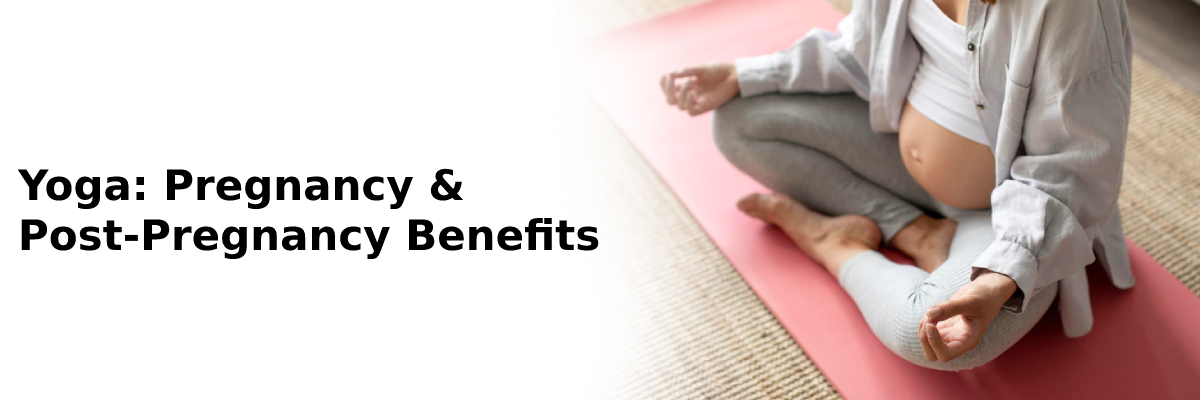
 IJCP Editorial Team
IJCP Editorial Team
Yoga: Pregnancy & Post-Pregnancy Benefits
If you're pregnant, have given birth recently, and are looking for ways to relax or stay fit, prenatal and postnatal yoga may be for you. But did you know that prenatal and postnatal yoga can help you prepare for labor and promote health for mother and child?
What is Prenatal Yoga?
Prenatal yoga is a type of yoga that is designed specifically for pregnant women. It aims to achieve balance in the emotional, mental, physical, and spiritual dimensions. It is essential to a healthy, happy pregnancy, from your physical body to your emotional state. Prenatal yoga helps in preparing mothers for childbirth. It relaxes the body and focuses on safe techniques.
A typical prenatal yoga class might include the following:
● Breathing: Concentrate on breathing slowly and deeply through your nose. Prenatal yoga breathing techniques may help reduce or manage shortness of breath during pregnancy and work through labor contractions.
● Gentle stretching: Different parts of your body, such as your neck and arms, will be encouraged to move through their full range of motion.
● Postures: You will gently move your body into different positions while standing, sitting, or lying on the ground to develop strength, flexibility, and balance.
● Relaxation: You'll relax your muscles and restore your resting heart rate and breathing rhythm at the end of each prenatal yoga class. To achieve a state of self-awareness and inner calm, you will be encouraged to listen to your breathing and pay close attention to sensations, thoughts, and emotions.
Benefits of Prenatal Yoga
Prenatal yoga can benefit your physical and psychological health and is a healthy practice to adopt during pregnancy. Read on to know how it can positively impact your pregnancy.
1. Prenatal yoga supports and helps adapt to the rapid pace of changes in a pregnant woman's body.
2. Prenatal yoga tones the physical body, particularly the pelvic floor, hip, and abdominal core muscles, in preparation for birth.
3. Pregnant women practicing prenatal yoga can have faith that their bodies will "open" to labor and birth.
4. Prenatal yoga promotes connection with the baby.
5. Lower back pain, nausea, insomnia, headaches, shortness of breath, and carpal tunnel syndrome are all common pregnancy ailments that you can cure with the help of prenatal yoga.
6. Prenatal yoga improves circulation in the body.
One of the most significant advantages of prenatal yoga may be the opportunity to connect with other expectant mothers. The class becomes a pregnancy support group where women connect with other women making the same choices and lifestyle changes.
Post-Pregnancy Yoga
After having a baby, your body and mind require time to heal and rest. Postpartum or postnatal yoga is a set of slow, low-intensity yoga practices. This type of yoga focuses on the recovery and restoration that pregnancy provides.
What is Postnatal Yoga?
Giving birth and maintaining life is a difficult journey. Postnatal yoga is all about honoring your postpartum body and calming your mind. This type of yoga is intended to aid in your body's recovery. It provides the most benefits during the first three months following childbirth.
Accessories that could make the experience of postnatal yoga more interesting or comfortable for you include:
● Yoga blocks or straps to provide additional stability
● Bolster pillow for extra support while seated or lying
● Blanket for added warmth and comfort in certain positions
● Candles or soft lighting to set the mood
The staff may provide everything you need if you go to a yoga class at a gym or studio. You'll want to come in comfortable clothing, such as yoga pants and a T-shirt, and bring a water bottle for hydration.
Benefits of Postnatal Yoga
Postpartum yoga may provide the following advantages:
● Increases pelvic floor strength
● Enhances calmness
● Assists with milk production
● Reduces anxiety and depression
● Reduces agitation and anger
● Enhances energy
● Reduces blood pressure
● Reduces muscle tension
● Postnatal meditation helps with relaxation
The Bottom Line
Throughout your pregnancy and post-pregnancy yoga practice, pay attention to your body. You can always halt and move into a familiar pose if something doesn't feel right. While at it, keep early yoga sessions short and work your way up to longer stretches of exercise. As the weeks pass, you'll feel stronger in your routine and even more confident in your parental role, both physically and mentally.
Remember that the abdominal wall separates during pregnancy as your belly expands. As a result, you should consult your doctor before engaging in extensive core work. Seek immediate medical attention if you notice increased bleeding, dizziness, or a rapid heart rate.

IJCP Editorial Team
Comprising seasoned professionals and experts from the medical field, the IJCP editorial team is dedicated to delivering timely and accurate content and thriving to provide attention-grabbing information for the readers. What sets them apart are their diverse expertise, spanning academia, research, and clinical practice, and their dedication to upholding the highest standards of quality and integrity. With a wealth of experience and a commitment to excellence, the IJCP editorial team strives to provide valuable perspectives, the latest trends, and in-depth analyses across various medical domains, all in a way that keeps you interested and engaged.










.png)




Please login to comment on this article